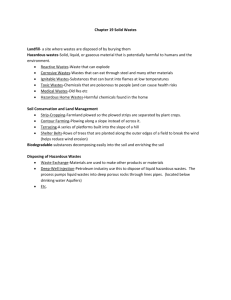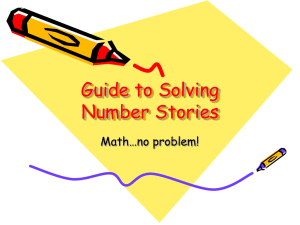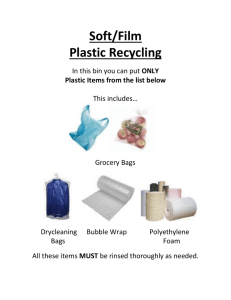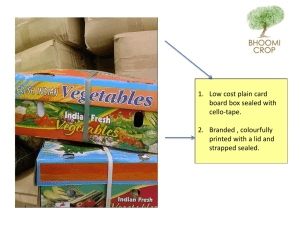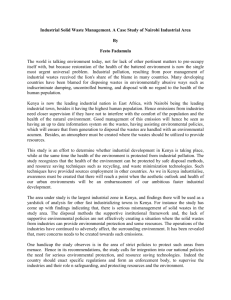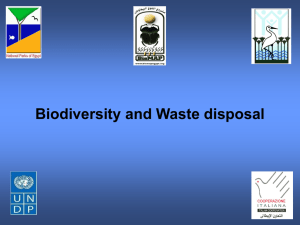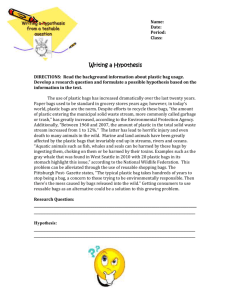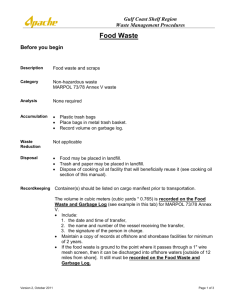command_medical_field_trip_questions - SCHS-AITR
advertisement
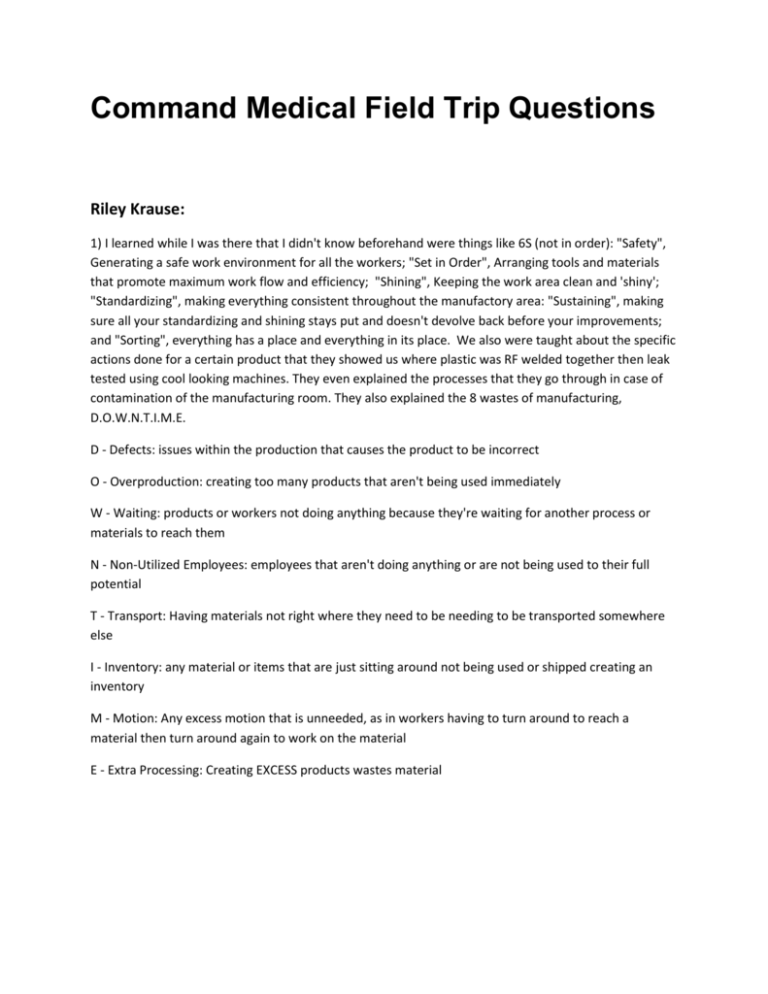
Command Medical Field Trip Questions Riley Krause: 1) I learned while I was there that I didn't know beforehand were things like 6S (not in order): "Safety", Generating a safe work environment for all the workers; "Set in Order", Arranging tools and materials that promote maximum work flow and efficiency; "Shining", Keeping the work area clean and 'shiny'; "Standardizing", making everything consistent throughout the manufactory area: "Sustaining", making sure all your standardizing and shining stays put and doesn't devolve back before your improvements; and "Sorting", everything has a place and everything in its place. We also were taught about the specific actions done for a certain product that they showed us where plastic was RF welded together then leak tested using cool looking machines. They even explained the processes that they go through in case of contamination of the manufacturing room. They also explained the 8 wastes of manufacturing, D.O.W.N.T.I.M.E. D - Defects: issues within the production that causes the product to be incorrect O - Overproduction: creating too many products that aren't being used immediately W - Waiting: products or workers not doing anything because they're waiting for another process or materials to reach them N - Non-Utilized Employees: employees that aren't doing anything or are not being used to their full potential T - Transport: Having materials not right where they need to be needing to be transported somewhere else I - Inventory: any material or items that are just sitting around not being used or shipped creating an inventory M - Motion: Any excess motion that is unneeded, as in workers having to turn around to reach a material then turn around again to work on the material E - Extra Processing: Creating EXCESS products wastes material 2) There was a lot that I learned that helped me figure out some issues we had with our own line, such as excess motion in certain steps and overproduction or batching that was happening for some of our steps. 3) I thought the actual process of creating the product was the most interesting thing of the whole trip, watching the machine press the plastic and it getting the same exact treatment with every product. 4) I think I would consider a career as it seems a cool thing to get into. The creating of the line or managing the material/economical processes would be extremely interesting to watch happen. Christian DeHaven: 1) I learned that the plastic they used was welded together which was interesting. 2) The way they controlled waste, I feel like it gave us a sense of idea of how and what to do with the extra material left behind from previously used materials. 3) Continuously looking over the product to make sure it was capable of being sold and produced well 4) Yes, because I think in the world even though there are many manufacturers we still need more and more to produce the new and upcoming plants that will be needed. Not to forget that being a manufacturer you gain knowledge and experience as you go up in the company through promotions and asking question. Ryan Meinke: 1.) I was surprised to learn that there are a few variables that go into an assembly line that I have never thought of such as making sure that the workers' jobs don't become too repetitive. 2.) I learned that we should incorporate a system of cross training that way we can compensate for people either being absent or simply wanting to do a different job for a short period of time. 3.) I personally thought that the FDA regulations such as the air contamination regulation were rather cool. 4.) I would prefer to work for a company that has to continually invent new products because just because I enjoy designing things, versus a company that just simply mass produces a couple if not one product. Kyler Lawson: 1) I learned that they have big procedures to stay clean and safe during work and also to make sure that their medical supplies do not get dirty. 2) I learned that we won’t want to pile up our products in case of a flaw in the design, because then we would just have a bunch of waste. 3) The most interesting thing I learned was how fast it is to make the medical bags and then test them to make sure they are up to standard. 4) I would consider it but I’m not sure if I would like it, I don’t think I could do the same thing over and over again. But it would be an interesting career. Cassidy Gall: 1) I learned about the 8 types of waste and what 6-S was. 2) Knowing about 6-S and the 8 types of waste helps to get a better understanding of how to make our assembly line and process more efficient. 3) I learned that the plastic for the products they produce is actually welded together, which I found quite interesting. 4) Yes, especially for Command Medical Products because they really impressed me as a company. The organization and efficiency of the company is excellent, and highly exceeded my expectations. The trip was very interesting and I learned many things I didn't know before. David Fortier: 1) I learned that they have to go through an airlock of sorts because if they let the air that’s not clean in it can contaminate the products. 2) I learned that we need to cut down on waste and make it so that we don’t have any of the products sitting and waiting so that it makes it go faster. 3) I think the most interesting thing that I learned is the processes of what they have to do to even go in the room. And if they have too many people in the room they would have to clean the whole room. 4) Yes but the pay would have to be good, be a nice and friendly company, and it would depend on what I would be doing. Gage Fisher: 1) I learned about what lean manufacturing actually is and it was really cool seeing an assembly line up close. 2) What we learned yesterday is going to help us with our project by helping us understand how an assembly line works when it is really good. 3) The most interesting thing I learned was that command does not make their own products but they manufacture products for companies. 4) I would consider a career in automatic manufacturing or car stereo manufacturing because that is what i am interested in Devon Morrison: 1) I learned about the 8 wastes and what they mean and why they should try and be avoided at all costs. I also learn about the RF machine and how they used radio frequencies to cut and meld bags so that they have a microscopic small chance to leak. 2) The importance of having every member along the long check for quality from the the person before them and not just have quality control test at the end. 3) The cleaning and sterilization process to even get into the room. 4) Not immediately but maybe if the hours and pay were good and the company produced items that I have an interest in. Matthew Sheppard: 1) I learned about 6S and how it’s applied to the work space. I also learned about D.O.W.N.T.I.M.E. or the 8 wastes. 2. What I learned can help us arrange the production line in a more efficient way. 3. The most interesting thing that I learned was just how Command Medical made the blood bags by welding the pvc bag together. One more of the amazing thing was just how serious they are about the work space being sterile. 4. I think I would like to have a career in manufacturing. It’s nice to be in an environment of constant change and improvement. Raymond Kimble: 1) I learned about the 8 wastes which I didn't know existed, and about the 6s which again I didn't know existed. These were really interesting since both are good ways to maximize efficiency and organization. 2) Learning about the 6s and 8 wastes is going to help us maximize efficiency. Due to the 8 wastes being good for pure efficiency and the 6s being really good for efficiency it could reduce required movement and time looking for something you need. 3) The most interesting thing I learned about is the Radio frequency welding. The reason i found this so interesting is I thought that the only ways to weld was the normal ways and i thought you could only weld metals. So finding out how those bags get put together was really cool. 4) I would consider one because it seems like a lot of different engineering positions and I want to be an engineer. Also manufacturing seems really interesting so I think it would be really interesting to work in manufacturing. Alec Davis: 1) I learned what an RF welder is. It is a machine that uses radio frequency in order to meld bags sealed. I also learned what the 6S system is and what it achieves in a working environment. I learned exactly what Command Medical made as well. 2) I think implementing some of the efficient processes could benefit us. Learning the eight types of waste also helped me personally to understand what exactly what they were and possibly how to prevent them. 3) The most interesting thing I learned was how flexible the manufacturing facility was. Our guides thoroughly explained how their manufacturing floor has changed in order to suit their client’s needs. I thought this was rather interesting but it should have been obvious, no plant can improve their processes without changing the layout of machines etc. 4) I would indeed be interested in a career in manufacturing because it offers a wide variety of options regarding exactly what kind of work someone does. What I find rather intriguing is that one can go into manufacturing with almost any form of education. Whether it is mechanical engineering or a type of management there are career opportunities everywhere in manufacturing. Brandon Kameka: 1) I didn’t know that after 2 hours they switched spots so they wouldn’t become fatigued. I think this helps because if you do the same motion over and over after a while you get tired and you might not perform as well if you were focus. 2) I think it would be a smart idea if every 30 minutes or so we switch jobs so that we can have a slight variation in the work period and we won’t become stressed or tired. 3) The most interesting thing I learned was about how many job possibilities and how well rounded many of the people where. If necessary you could always help another worker if they are falling behind at their station. 4) Yes. It would be a great job to work your way up the line and possibly even start your own company. I think that it would be a great opportunity to get submerged with different job possibilities.


